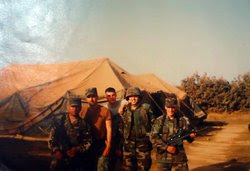- Subscribe to PCF Networked Blog Daily Updates
- Subscribe to our Twitter / Google / Yahoo Daily Updates
TIJUANA, MEXICO — Hector Barajas lives in a rundown apartment in Rosarito, Mexico. His small living room is cluttered with makeshift items appropriated as furniture: upended 20-gallon bucket chairs, chipped TV dinner trays trying to stand alone on teetering bent legs. There's even a door-less broken fridge that serves as a bookshelf. After growing up in Compton, California, Barajas served for seven years in the U.S Army's 82nd Airborne Division. He had a green card, and was proud to serve what he considered to be his country. Now, Barajas says, he never imagined he'd be banned for life from the United States. "I was a legal resident when I entered the military in 1995," he said. "I got out in 2001 with two honorable discharges. I was under the impression that I was a U.S. citizen automatically because of the recruiters."
That wasn't the case. Though military service can speed up the process of becoming a citizen, it's not automatic. Barajas got into trouble after leaving the military, and was convicted for discharging a firearm into a vehicle. He served a 3-year prison sentence. Because he had a green card, the conviction meant that he was subject to mandatory deportation. If he had been a U.S. citizen, Barajas would have walked free after serving his time. Instead, he was taken into ICE custody, brought across the border, and dropped off in Tijuana.
His family remained behind in California.
For the first few months, Barajas struggled to adjust. With help from another deported veteran, he found a modest apartment in Rosarito, about 15 miles south of the border. He's been there since 2004.
 |
Photo courtesy Fabian Rebolledo
U.S. Army veteran Fabian Rebolledo with fellow servicemen
|
Fabian Rebolledo, 36, is a recent arrival to Mexico. He's a Kosovo combat vet and former Army paratrooper. Rebolledo arrived just four months ago, after spending twenty-four years in Los Angeles. "My deportation was due to a violation of probation," he said. "It was due to a insufficient funds check. Seven hundred fifty dollars." Like Barajas, Rebolledo thought that military service would protect him.
"I was a legal resident," he said. "And actually, I joined the military because I wanted to become a citizen. I was going to be the first member of my family to become a citizen". But before the bad check, Rebolledo had two DUI convictions. Although his crimes were nonviolent, they were still enough to ban him from the U.S. for the rest of his life. That's because of a 1996 immigration law that expanded the list of crimes considered to be "aggravated felonies." The law made some misdemeanor crimes result in permanent, mandatory deportation for non-citizens. Today, Hector and his fellow banned veterans would like to see some judicial discretion come into play in these cases, taking military service into account. Some politicians, like Bob Filner, former Chairman of the House Committee on Veteran's Affairs and newly elected Mayor of San Diego, have shown some sympathy for these efforts.
Right now, not only is there no judicial review — there's also no one keeping count of how many vets are deported. "No, no," said Lauren Mack, spokesperson for Immigration and Customs Enforcement (ICE) in San Diego. "We don't track vets." Neither does anyone else.
Immigration attorney Craig Shagin says that getting hard numbers is impossible. Even attorneys representing vets in court, "may not even be asking their clients, 'have you ever served in the military?' Because it isn't an outcome affirmative of anything, it's not going to change anything."
 |
By Erin Siegal.
Deported Vietnam combat veteran Hector Barrios sits in his Tijuana apartment.
|
Barajas is searching for other deported vets and trying to rally them and others. It's a lot like amateur detective work. He makes phones calls, follows leads, sends Facebook requests, and tracks social media. Vets who commit crimes, do time, and are then deported can still be eligible for benefits. However, it's impossible for them to collect most of those benefits.
Nevertheless, there is one benefit they can collect: burial. "We had a guy who died about four months ago," Barajas said. "He was deported, not allowed to go into the U.S. When (he) died, they let his body go. And then they gave him a nice certificate, thank you for serving our country. When I die, I can be buried as an American."
It's true. Unless they've been dishonorably discharged, the Office of Veteran's Affairs says that all military veterans are indeed entitled to a burial in a national cemetery. Immigration law doesn't restrict the corpses of veterans from coming "home" to American soil. Only then can deported vets re-enter the country legally, in order to be laid to rest as American service members: with a grave marker and a American flag.
(kbps)
Pakistan Cyber Force

No comments:
Post a Comment